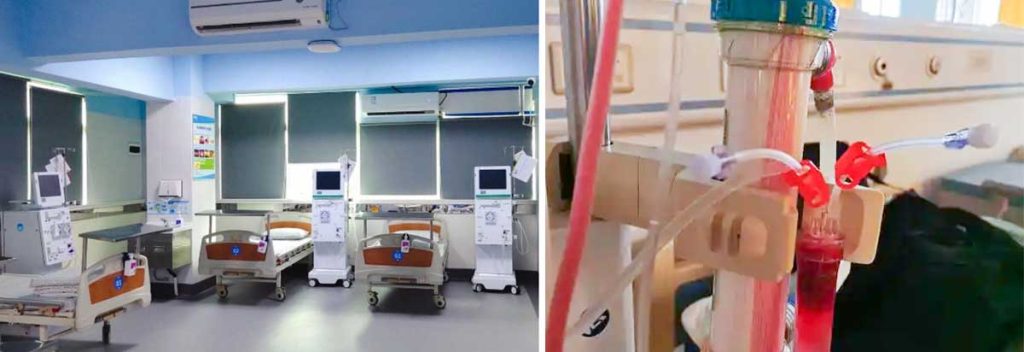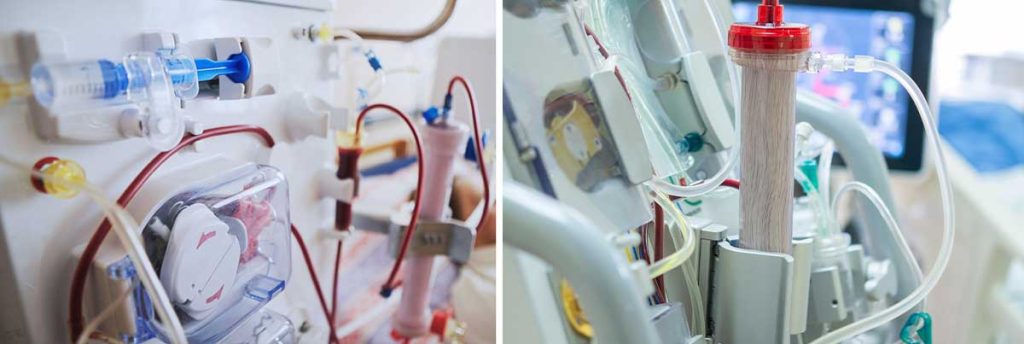

Managing dialysis patient with diarrhea requires a careful and targeted approach to ensure both safety and effective treatment. Approximately 19% of individuals beginning hemodialysis experience diarrhea, often accompanied by complications such as infections or imbalances in protein and electrolyte levels. A dialysis patient with diarrhea may also exhibit elevated inflammatory markers, including higher white blood cell counts and increased C-reactive protein levels. These issues can interfere with dialysis sessions and heighten the risk of dehydration or malnutrition. Proper management focuses on identifying the root cause, ensuring adequate hydration, and working closely with healthcare providers to adjust treatment plans as necessary.
Key Takeaways
- Find foods that cause diarrhea. Skip high-fiber, fatty, or spicy foods that upset the stomach.
- Watch fluid intake carefully. Use rehydration drinks to replace lost fluids but follow fluid limits.
- Talk to doctors often. Telling them symptoms early can stop problems like dehydration or poor nutrition.
- Change dialysis times if needed. Shorter and more frequent sessions can help keep fluids balanced during diarrhea.
- Take medicines safely. Antidiarrheal pills and probiotics may help, but always ask a doctor first.
Causes of Diarrhea in Dialysis Patients
Dietary Triggers
Dietary habits can significantly impact the digestive health of dialysis patients. Certain foods, such as those high in fiber or fat, may lead to diarrhea. Excessive consumption of dairy products, artificial sweeteners, or spicy foods can also irritate the gastrointestinal tract. Dialysis patients often follow strict dietary guidelines, but deviations from these recommendations may trigger symptoms. For example, consuming potassium-rich fruits or vegetables in large quantities can upset the stomach. Monitoring food intake and identifying potential triggers can help reduce the risk of diarrhea.
Medication Side Effects
Medications prescribed to dialysis patients may contribute to diarrhea. Antibiotics, often used to treat infections, can disrupt the balance of gut bacteria. This imbalance may result in loose stools or frequent bowel movements. Steroids, another common medication, can also irritate the digestive system. Additionally, phosphate binders or iron supplements, which are frequently prescribed to dialysis patients, may cause gastrointestinal discomfort. Healthcare providers should evaluate medication regimens to identify and address potential side effects.
Infections
Infections are a leading cause of diarrhea in dialysis patients. Bacterial pathogens such as Escherichia coli, Klebsiella pneumoniae, and Clostridium difficile are commonly associated with gastrointestinal infections. These infections may occur due to weakened immune systems or exposure to contaminated food and water. In some cases, the use of antibiotics to treat infections can further exacerbate diarrhea by disrupting gut flora. Preventive measures, including proper hygiene and food safety practices, are essential to reduce the risk of infection.
Underlying Health Conditions
Certain underlying health conditions can increase the likelihood of diarrhea in dialysis patients. These conditions often affect the gastrointestinal system or the body’s ability to maintain balance, making patients more vulnerable to digestive issues.
One common cause is diabetes, which frequently coexists with kidney disease. Diabetes can lead to a condition called diabetic enteropathy, where nerve damage in the intestines disrupts normal bowel movements. This condition often results in chronic diarrhea. Patients with diabetes undergoing hemodialysis may experience worsened symptoms due to the dialysis places on the body.
Inflammatory bowel diseases (IBD), such as Crohn’s disease or ulcerative colitis, also contribute to diarrhea in dialysis patients. These conditions cause inflammation in the digestive tract, leading to frequent and loose stools. Dialysis patients with IBD require careful monitoring to prevent dehydration and electrolyte imbalances.
Liver disease is another factor that can exacerbate diarrhea. When the liver fails to function properly, it can lead to bile acid malabsorption, which irritates the intestines and causes diarrhea. Patients with both liver and kidney issues face a higher risk of complications during dialysis treatments.
Weakened immune systems, often seen in dialysis patients, make them more susceptible to infections that cause diarrhea. Conditions like HIV or autoimmune diseases can further compromise immunity, increasing the risk of gastrointestinal infections.
Healthcare providers must assess these underlying conditions when managing diarrhea in dialysis patients. Addressing the root cause helps improve symptoms and ensures the effectiveness of hemodialysis. Regular communication between patients and their medical teams is essential for identifying and treating these health issues promptly.
Safe Management of Diarrhea
Fluid Management and Hydration

Proper fluid management is critical for a dialysis patient with diarrhea. Diarrhea can lead to significant fluid loss, increasing the risk of dehydration. Rehydration therapy plays a vital role in restoring the body’s fluid balance. However, dialysis patients often face the challenge of maintaining fluid restrictions to prevent complications like fluid overload.
Healthcare providers can use tools like Bioelectrical Impedance Analysis (BIA) to assess fluid status accurately. This non-invasive method measures parameters such as total body water (TBW), extracellular water (ECW), and intracellular water (ICW). The table below highlights the clinical relevance of BIA:
| Evidence Type | Description |
|---|---|
| BIA Method | A non-invasive method for assessing fluid status and body composition in dialysis patients. |
| Parameters | Total body water (TBW), extracellular water (ECW), intracellular water (ICW), and overhydration (OH) can be derived from BIA measurements. |
| Clinical Relevance | BIA provides an objective assessment that can guide ultrafiltration goals and detect subclinical fluid overload. |
By using BIA, healthcare teams can tailor rehydration therapy to meet individual needs while maintaining fluid restrictions. This approach minimizes the risk of complications and ensures effective management of diarrhea.
Monitoring Electrolytes
Diarrhea often disrupts the balance of electrolytes in the body. Sodium, potassium, and chloride levels may drop significantly, leading to symptoms like fatigue, muscle weakness, or irregular heart rhythms. Regular monitoring of these electrolytes is essential for dialysis patients.
Laboratory tests can help detect imbalances early. For example, low potassium levels may require dietary adjustments or supplements, while high levels might necessitate changes in dialysis fluid composition. Sodium levels should also be closely monitored to prevent dehydration or fluid overload. Maintaining a stable electrolyte balance supports overall health and improves the effectiveness of hemodialysis.
Consulting Healthcare Providers
Healthcare providers play a crucial role in managing diarrhea in dialysis patients. They can identify the underlying cause, recommend appropriate treatments, and adjust dialysis schedules if necessary. For instance, they may prescribe medications to control diarrhea or suggest dietary changes to prevent recurrence.
Patients should report symptoms promptly to their medical team. Early intervention can prevent complications like severe dehydration or malnutrition. Regular follow-ups ensure that treatment plans remain effective and tailored to the patient’s needs. Open communication between patients and providers is key to successful management.
Using Medications Safely
Medications play a crucial role in managing diarrhea in patients undergoing dialysis. However, their use requires careful consideration to avoid adverse effects or interactions with existing treatments. Healthcare providers must evaluate each patient’s medical history and current prescriptions before recommending any medication.
Antidiarrheal drugs, such as loperamide, can help reduce the frequency of bowel movements. These medications slow intestinal motility, allowing the body to absorb more water and nutrients. However, they should only be used under medical supervision. Overuse may lead to constipation or mask underlying causes of diarrhea.
Probiotics offer another option for managing diarrhea. These supplements restore the balance of gut bacteria, especially after antibiotic use. Studies suggest that probiotics can reduce the duration and severity of diarrhea caused by infections. Patients should consult their healthcare team to select the most appropriate probiotic strain.
Electrolyte supplements may also be necessary. Diarrhea often depletes essential minerals like potassium and sodium. Replenishing these electrolytes helps maintain the body’s balance and supports effective hemodialysis. Oral rehydration solutions (ORS) can provide a safe and effective way to restore lost fluids and minerals.
Healthcare providers must also monitor for potential drug interactions. For example, some antibiotics used to treat infections may worsen diarrhea by disrupting gut flora. Adjusting dosages or switching medications can help minimize side effects. Regular follow-ups ensure that treatments remain effective and safe.
Patients should never self-medicate. Reporting symptoms promptly allows healthcare teams to address issues early. This approach prevents complications and ensures that diarrhea management aligns with the overall dialysis treatment plan.
Adjustments to Dialysis Treatment
Modifying Hemodialysis Schedules
Diarrhea can disrupt the fluid balance in dialysis patients, making it necessary to adjust hemodialysis schedules. Frequent diarrhea episodes may lead to dehydration, which can lower blood pressure and reduce the effectiveness of dialysis. In such cases, healthcare providers may recommend shorter but more frequent dialysis sessions. This approach helps maintain fluid balance without overburdening the patient’s body.
Patients experiencing diarrhea may also require adjustments to the timing of their dialysis sessions. For example, scheduling dialysis after rehydration therapy ensures that the patient’s fluid levels are stable. Regular communication between patients and their medical teams is essential to determine the most effective schedule.
Adjusting Dialysis Fluid Composition
The composition of dialysis fluids plays a critical role in managing patients with diarrhea. Diarrhea often causes significant electrolyte loss, including potassium, sodium, and bicarbonate. Adjusting the electrolyte concentration in dialysis fluids can help restore balance and prevent complications.
For instance, patients with low potassium levels may benefit from dialysis fluids with higher potassium concentrations. Conversely, those with elevated potassium levels may require fluids with reduced potassium content. Sodium levels in the dialysis fluid may also need modification to address dehydration or prevent fluid overload.
Healthcare providers use laboratory tests to monitor electrolyte levels and guide these adjustments. Tailoring dialysis fluid composition to the patient’s needs ensures effective treatment and minimizes the risk of adverse effects.
Monitoring for Dehydration or Fluid Overload

Monitoring fluid status is crucial for dialysis patients with diarrhea. Dehydration can occur due to excessive fluid loss, while fluid overload may result from improper rehydration. Both conditions can lead to serious complications if left unaddressed.
Studies have shown that patients with diarrhea often exhibit lower serum creatinine levels and an elevated urea nitrogen to creatinine ratio, indicating dehydration. Regular weight measurements can help detect changes in fluid status. For example, the DHAKA study calculated dehydration percentages based on weight changes during rehydration, while the NIRUDAK study used frequent weight measurements to improve dehydration detection models.
| Study | Findings | Methodology |
|---|---|---|
| DHAKA Study | Percent dehydration calculated based on weight change | Patients weighed every eight hours to determine stable weight |
| NIRUDAK Study | Improved prediction models for dehydration detection | Patients weighed every four hours until stable weight obtained |
Healthcare providers should use these methods to monitor fluid status and adjust treatment plans accordingly. Early detection of dehydration or fluid overload ensures the safety and well-being of dialysis patients with diarrhea.
Conclusion
Managing a dialysis patient with diarrhea requires a proactive and informed approach. Proper fluid management, dietary adjustments, and medical guidance form the foundation of effective care. Early intervention helps prevent complications like dehydration or electrolyte imbalances. Regular monitoring ensures that the patient’s condition remains stable and that hemodialysis treatments continue to be effective. By addressing symptoms promptly and tailoring care to individual needs, healthcare providers can safeguard the well-being of dialysis patients experiencing diarrhea.
